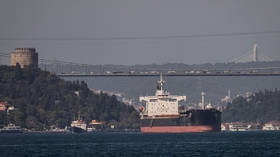90% of UK Covid cases came from Spanish strain, study shows
Holidaymakers were key in spreading a variant of coronavirus across Europe that is behind 90 percent of cases in the UK, after a super-spreader event among Spanish farmers sparked a countrywide infection.
Research showed that the Spanish strain accounted for 90 percent of sequences from the UK, 60 percent from Ireland, 40 percent from the Netherlands, 30 percent from Switzerland and has been identified in Belgium, France, Germany, Italy, Latvia, Norway, and Sweden.
The strain of the virus, 20A.EU1, started among farm workers in Spain, spread throughout the local population, and was carried by people returning from holiday to countries across Europe, helping to proliferate the spread of the disease, and resulting in cases soaring across the continent.
Also on rt.com Spain declares state of emergency, imposes nationwide curfew to curb increasing Covid-19 infection rateResearchers at the University of Basel, at ETH Zürich in Basel, and in the SeqCOVID-Spain consortium analyzed the spread of coronavirus across Europe and linked it back to “loosening” social distancing measures this summer.
The study criticized the lack of screening of passengers at airports and the failure to enforce and follow proper quarantine measures, which created a “good environment” where the virus was able to spread widely.
Dr. Emma Hodcroft, an evolutionary geneticist at the University of Basel, and one of the authors of the study, told the BBC: “Rising cases in Spain, combined with that increase in holiday travel, allowed the virus to move to many different countries across Europe and, when it got there, it was able to spread quite successfully”.
Her colleagues were clear to state that closing borders and introducing travel restrictions for long periods of time is not “feasible or desirable.” However, they highlighted that their work showed it is “critical” for countries who have brought their case numbers under control to explore more effective and efficient ways to “open up without risking a rise in cases.”
As of October 30, nearly seven million cases of coronavirus and more than 217,000 deaths have been confirmed across Europe, with France, Italy, Spain, and the UK experiencing significant spikes in case numbers in recent weeks.
Also on rt.com State of emergency in Spain extended for 6 months as regions are given Covid-19 powers over curfews & bordersIf you like this story, share it with a friend!














